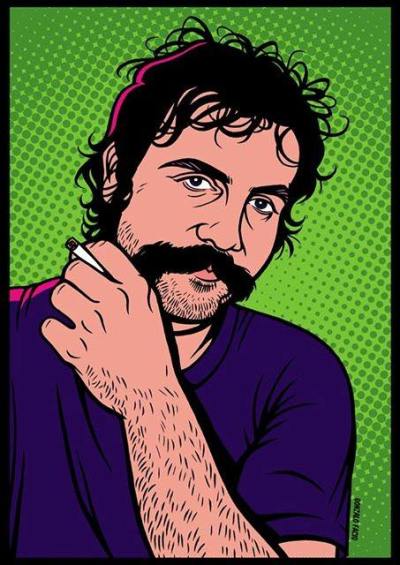
Lester Bangs’ moniker, “America’s Greatest Rock Critic” is a title well deserved. His dissection of albums was a remarkable, if not a brutally honest representation of his philosophy. He did not suffer fools and above anything else, he valued originality from artists. His foray into the musical world was through a love of jazz, specifically John Coltrane, and an enormous respect for the beat generation of the 1950s. His biggest regret was that he was not born 10 years earlier and able to be a part of that scene. In 1964, the Beatles appeared on Bangs’ radar and he was turned on to the rabid infection of rock n’ roll. In 1969, he wrote his first review on MC5’s debut album Kick Out The Jams and sent it to Rolling Stone, daring them to print it. Saying, “Look, fuckheads, I’m as good as any writer you’ve got in there. You’d better print this or give me the reason why!” Rolling Stone printed his review.
Bang’s review of the iconic MC5 album was not a positive one. He found their music crude and primitive. To him this was a style that the Kingsman, the Troggs or arguably Question Mark and the Mysterians had perfected years before. He sought something original that was not steeped in the overused hype of teenage revolution. He wanted Rock n’ Roll that represented life as an adult. That was something he found in the Velvet Underground. Years later he would also find it in New York during the rise of CBGB’s and again during his journey to the England. There he encountered the Clash, a band with obvious influences from reggae and the blues, spouting a clear message.
Bangs freelanced for Rolling Stone from 1969 to 1973, writing notable reviews about releases such as Alice Cooper’s Killer and Janis Joplin’s last recorded album Joplin in Concert. The latter was remarked upon with notable sincerity to the late Joplin. He commented on the strange acceptance that came with such an early death, saying “It’s not just that this kind of early death has become a fact of life that is disturbing, but that it’s been accepted as a given so quickly. We’re getting to the point where we merely anticipate between exits, idly wondering which will be the next among our “heroes” to go. And caring less all the time.”
Though his sincerity was notable, his brutal honesty was more so. If he didn’t appreciate an album, he was not afraid to write a negative review. His responsibility was to the fan, not to be a PR person to sing the praises of the band. Not surprisingly, his approach to reviewing music was not without some controversy. It won him the ire of musicians, some of whom he loved, but his rapid fire, seemingly free-formed reviews won him the respect of his readers. He was honest to a fault. Ironically, after one particularly negative review of the band, Canned Heat, he lost his gig at Rolling Stone.
Soon after, he joined the staff at Creem Magazine, where he helped put a spotlight on emerging artists and groups, such as Lou Reed, Blondie and the New York Dolls. He helped bring the emerging punk narrative into print. His devotion to music was so noted, that even after he left Creem in 1976, he was still considered a favourite critic by readers for years after his departure.
In 1976 Bangs moved to Brooklyn, where he began freelancing for the Village Voice and many other publications. Bangs was a notable fan of the emerging punk movement. He appreciated the CBGB’s scene and made it out to England to witness the beginnings of the Clash on their White Riot Tour. Despite his appreciation for the up and coming movement, his objective criticism still remained strong and honest. This was especially true in the matters of race in the punk new wave scene. In his 1979 article “The White Noise Supremacists”, he talks about the apparent and uncomfortable acceptance of casual racism in the new scene. Punk music and style seems to have this divide between a scene that’s mostly white and certain obvious influences, such as James Brown or Chuck Berry.
Bangs highlighted attempts at showcasing rock n’ roll as a positive force for change, citing the Rock Against Racism concert. Bangs found little hope in such an effort in New York, saying ”Yippie bullshit aside, it could never happen in New York, which is deeply saddening, not because you want to think that rock ‘n’ roll can save the world, but because since rock ‘n’ roll is bound to stay in your life, you would hope to see it reach some point where it might not add to the cruelty and exploitation already in the world.” Toward the end of the article, Bangs suggests his readers start to make a private, humble effort to address racism.
Apart from the criticism, Bangs was a musician in his own right. In 1979, Bangs released a seven-inch called Let it Blurt/Live. He recorded an album with a punk band from Austin, Texas, called the Delinquents. The LP was titled Jook Savages on the Brazos, it can be found on Discogs. Jook Savages on the Brazos sounds like a combination of punky angst mixed in with a bluesy country album.
Unfortunately, Bangs passed away on April 30, 1982 at age 33. He had planned to go to Mexico to write a book about living in New York. He left behind an impressive amount of work that any reader can and should check out. A book of collected material, Psychotic Reaction and Carburetor Dung, is good place to get acquainted with his work. Readers can also check out the Rolling Stone archives. For a good laugh, check out Phillip Seymour Hoffman’s portrayal of Bangs in Almost Famous (2000).

